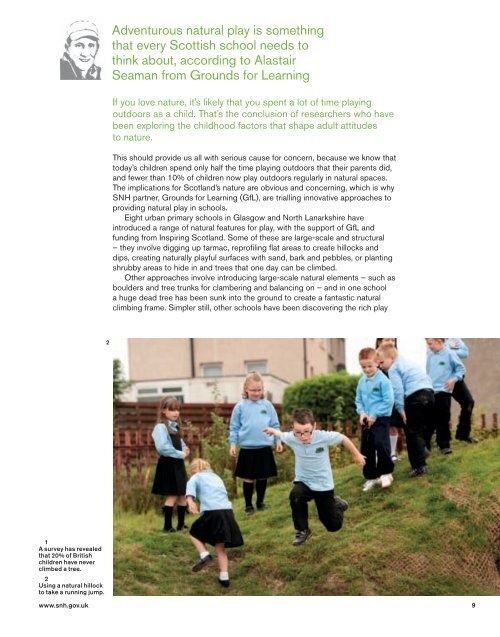The Nature of Scotland â Autumn 2011 â Issue 13
The Nature of Scotland â Autumn 2011 â Issue 13 The Nature of Scotland â Autumn 2011 â Issue 13
1 The power of natural play 8 The Nature of Scotland
Adventurous natural play is something that every Scottish school needs to think about, according to Alastair Seaman from Grounds for Learning If you love nature, it’s likely that you spent a lot of time playing outdoors as a child. That’s the conclusion of researchers who have been exploring the childhood factors that shape adult attitudes to nature. This should provide us all with serious cause for concern, because we know that today’s children spend only half the time playing outdoors that their parents did, and fewer than 10% of children now play outdoors regularly in natural spaces. The implications for Scotland’s nature are obvious and concerning, which is why SNH partner, Grounds for Learning (GfL), are trialling innovative approaches to providing natural play in schools. Eight urban primary schools in Glasgow and North Lanarkshire have introduced a range of natural features for play, with the support of GfL and funding from Inspiring Scotland. Some of these are large-scale and structural – they involve digging up tarmac, reprofiling flat areas to create hillocks and dips, creating naturally playful surfaces with sand, bark and pebbles, or planting shrubby areas to hide in and trees that one day can be climbed. Other approaches involve introducing large-scale natural elements – such as boulders and tree trunks for clambering and balancing on – and in one school a huge dead tree has been sunk into the ground to create a fantastic natural climbing frame. Simpler still, other schools have been discovering the rich play 2 1 A survey has revealed that 20% of British children have never climbed a tree. 2 Using a natural hillock to take a running jump. www.snh.gov.uk 9
- Page 1: Scottish Natural Heritage Autumn 20
- Page 4 and 5: Credits The Nature of Scotland The
- Page 6 and 7: Autumn 4 The Nature of Scotland
- Page 8 and 9: 2 The art of love In autumn, it's n
- Page 12 and 13: value of smaller scale, loose, natu
- Page 14 and 15: 7 8 If you go down to the woods Nat
- Page 16 and 17: People of all backgrounds and circu
- Page 18 and 19: Personal stories On the edge of Dun
- Page 20 and 21: NEWS Dolly scientist working on clo
- Page 22 and 23: NEWS Greater protection for shark,
- Page 24 and 25: NEWS Extra rangers help capercailli
- Page 26 and 27: Inspired by nature 1 As usual, we r
- Page 28 and 29: In our third article to mark the 20
- Page 30 and 31: 3 Floating homes Office workers wel
- Page 32 and 33: Dualchas coitcheann Common heritage
- Page 34 and 35: Supporting sporting interests 32 Th
- Page 36 and 37: 2 Bad press Promoting country sport
- Page 38 and 39: Reserve focus Visit the Clyde Valle
- Page 40 and 41: 24 2 1 Cartland Bridge Start from t
- Page 42 and 43: 7 7 There are good numbers of badge
- Page 44 and 45: SNH Area News Northern Isles and No
- Page 46 and 47: SNH Area News Strathclyde and Ayrsh
- Page 48 and 49: Events diary 2011 October Friday 7
- Page 50 and 51: Hare’s-tail cotton grass, Uath Lo
- Page 52 and 53: Bruce Percy 1 Coming from an arts b
- Page 54 and 55: Lorne Gill Lorne is the full-time p
- Page 56: Sandra Bartocha Sandra is a German
- Page 59 and 60: 1 interested to learn about some of
Adventurous natural play is something<br />
that every Scottish school needs to<br />
think about, according to Alastair<br />
Seaman from Grounds for Learning<br />
If you love nature, it’s likely that you spent a lot <strong>of</strong> time playing<br />
outdoors as a child. That’s the conclusion <strong>of</strong> researchers who have<br />
been exploring the childhood factors that shape adult attitudes<br />
to nature.<br />
This should provide us all with serious cause for concern, because we know that<br />
today’s children spend only half the time playing outdoors that their parents did,<br />
and fewer than 10% <strong>of</strong> children now play outdoors regularly in natural spaces.<br />
<strong>The</strong> implications for <strong>Scotland</strong>’s nature are obvious and concerning, which is why<br />
SNH partner, Grounds for Learning (GfL), are trialling innovative approaches to<br />
providing natural play in schools.<br />
Eight urban primary schools in Glasgow and North Lanarkshire have<br />
introduced a range <strong>of</strong> natural features for play, with the support <strong>of</strong> GfL and<br />
funding from Inspiring <strong>Scotland</strong>. Some <strong>of</strong> these are large-scale and structural<br />
– they involve digging up tarmac, repr<strong>of</strong>iling flat areas to create hillocks and<br />
dips, creating naturally playful surfaces with sand, bark and pebbles, or planting<br />
shrubby areas to hide in and trees that one day can be climbed.<br />
Other approaches involve introducing large-scale natural elements – such as<br />
boulders and tree trunks for clambering and balancing on – and in one school<br />
a huge dead tree has been sunk into the ground to create a fantastic natural<br />
climbing frame. Simpler still, other schools have been discovering the rich play<br />
2<br />
1<br />
A survey has revealed<br />
that 20% <strong>of</strong> British<br />
children have never<br />
climbed a tree.<br />
2<br />
Using a natural hillock<br />
to take a running jump.<br />
www.snh.gov.uk 9



